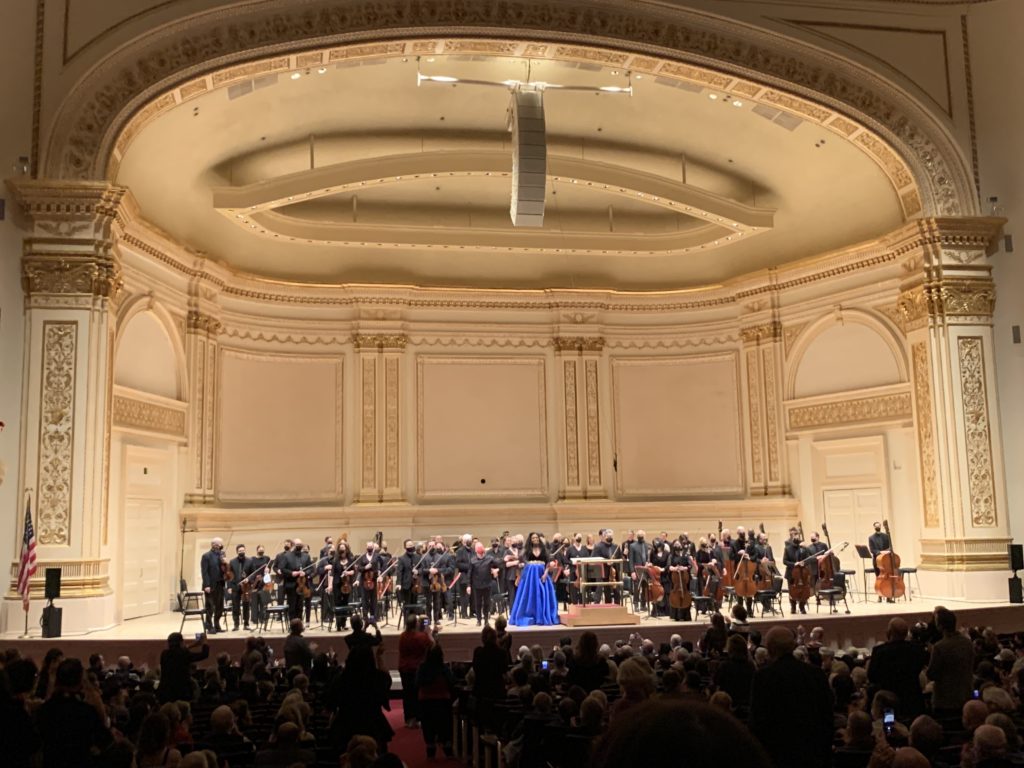THE HANGOVER REPORT – Maestro Nézet-Séguin leads the Philadelphia Orchestra in a rich, thoughtfully curated program, featuring two female composers of color
- By drediman
- February 9, 2022
- No Comments

Last night, conductor Yannick Nézet-Séguin returned to the podium in New York to lead his mighty Philadelphia Orchestra at Carnegie Hall. After an unusually hectic few months following the post-pandemic return of in-person performances (during which time he premiered a pair of new operas to New York audiences, in addition to his numerous other assignments), the beloved maestro took a restorative month off from conducting duties to recharge his batteries. In last night’s return, he led the Philly forces with exuberance and exactitude in a rich, thoughtfully curated program that, for the most part, eschewed standard European classical music fare. In its place, the works of four distinctive American composers – including two women of color – were refreshingly programmed.
The evening began with a suite from Matthew Aucoin’s new opera Eurydice, which had its New York premiere at the Metropolitan Opera last November, also under the baton of Nézet-Séguin (who is also the Met’s music director). I echo my thoughts from when I first saw the opera in the fall – Mr. Aucoin (who was in the audience last night) is a composer with a special gift for melding color and invention with expressive lyricism, which lends itself beautifully in the service of music theater. In the absence of the opera’s narrative, his music nevertheless remains compelling. Indeed, the Philadelphia Orchestra brought out the shimmering beauty (those strings!) of the composer’s undulating work in both subtle and forceful ways, injecting drama into the internal structure of the suite.
The program continued with the Samuel Barber’s well-trodden Knoxville: Summer of 1915, which is set to James Agee’s wistful depiction of a summer evening in Tennessee. The last time I saw the piece was when the New York Philharmonic played it with Broadway darling Kelli O’Hara, who memorably put an intimate, deeply personal spin on the work. Last night, soprano Angel Blue took another approach by bringing majesty to Barber and Agee’s musical monologue, exploding the cherished memories to epic proportions with her plush, assured voice. Ms. Blue brought the same ravishing expansiveness to Valerie Coleman’s inspiring This Is Not a Small Voice, which made its welcome New York debut last night. In both works, the orchestra played with both warmth and character.
The evening concluded with the storied orchestra playing Forence Price’s Symphony No. 1, which was premiered in 1933 by the Chicago Symphony Orchestra. Ms. Price has the distinction of being one of the our country’s accomplished composers of color (let alone female composers of color), and it’s about time classical music influencers like Nézet-Séguin and major orchestras like the Philadelphia forces finally start championing their works. Ms. Price’s four-movement symphony is a fascinating concoction, a sort of melting pot of classical symphonic writing (the first and fourth movements) and African American spirituals and hymns (the middle two movements). Throughout, the playing was crisp and alive, with the Largo and Allegro movements being especially dignified and transcendent.
HIGHLY RECOMMENDED
THE PHILADELPHIA ORCHESTRA
Classical Music
Carnegie Hall
Approximately 2 hours (with one intermission)
Closed

 Copyright © 2024
Copyright © 2024
Leave a Reply